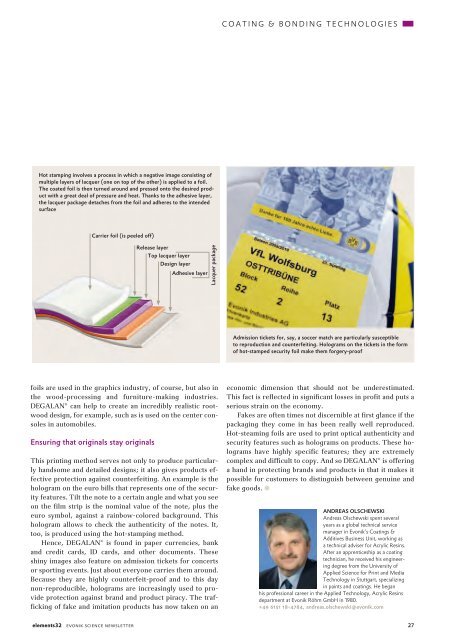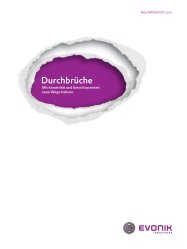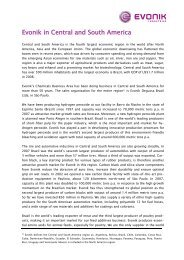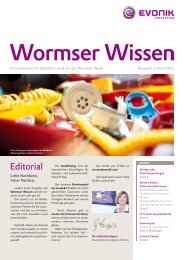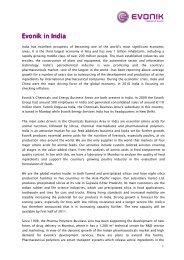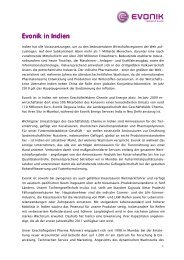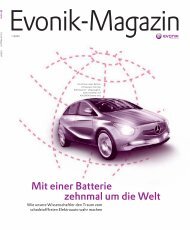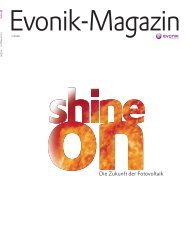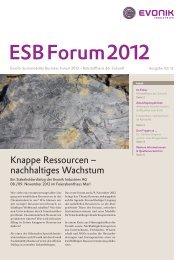Download - Evonik Industries
Download - Evonik Industries
Download - Evonik Industries
You also want an ePaper? Increase the reach of your titles
YUMPU automatically turns print PDFs into web optimized ePapers that Google loves.
Hot stamping involves a process in which a negative image consisting of<br />
multiple layers of lacquer (one on top of the other) is applied to a foil.<br />
The coated foil is then turned around and pressed onto the desired product<br />
with a great deal of pressure and heat. Thanks to the adhesive layer,<br />
the lacquer package detaches from the foil and adheres to the intended<br />
surface<br />
Carrier foil (is peeled off)<br />
foils are used in the graphics industry, of course, but also in<br />
the wood-processing and furniture-making industries.<br />
DEGALAN® can help to create an incredibly realistic rootwood<br />
design, for example, such as is used on the center consoles<br />
in automobiles.<br />
Ensuring that originals stay originals<br />
This printing method serves not only to produce particularly<br />
handsome and detailed designs; it also gives products effective<br />
protection against counterfeiting. An example is the<br />
hologram on the euro bills that represents one of the security<br />
features. Tilt the note to a certain angle and what you see<br />
on the film strip is the nominal value of the note, plus the<br />
euro symbol, against a rainbow-colored background. This<br />
hologram allows to check the authenticity of the notes. It,<br />
too, is produced using the hot-stamping method.<br />
Hence, DEGALAN® is found in paper currencies, bank<br />
and credit cards, ID cards, and other documents. These<br />
shiny images also feature on admission tickets for concerts<br />
or sporting events. Just about everyone carries them around.<br />
Because they are highly counterfeit-proof and to this day<br />
non-reproducible, holograms are increasingly used to provide<br />
protection against brand and product piracy. The trafficking<br />
of fake and imitation products has now taken on an<br />
elements32 evonik science newsletter<br />
Release layer<br />
Top lacquer layer<br />
Design layer<br />
Adhesive layer<br />
Lacquer package<br />
c o A t i n G & B o n D i n G t e c H n o l o G i e S<br />
Admission tickets for, say, a soccer match are particularly susceptible<br />
to reproduction and counterfeiting. Holograms on the tickets in the form<br />
of hot-stamped security foil make them forgery-proof<br />
economic dimension that should not be underestimated.<br />
This fact is reflected in significant losses in profit and puts a<br />
serious strain on the economy.<br />
Fakes are often times not discernible at first glance if the<br />
packaging they come in has been really well reproduced.<br />
Hot-steaming foils are used to print optical authenticity and<br />
security features such as holograms on products. These holograms<br />
have highly specific features; they are extremely<br />
complex and difficult to copy. And so DEGALAN® is offering<br />
a hand in protecting brands and products in that it makes it<br />
possible for customers to distinguish between genuine and<br />
fake goods. l<br />
ANDREAS OLSCHEWSKI<br />
Andreas olschewski spent several<br />
years as a global technical service<br />
manager in evonik’s coatings &<br />
Additives Business Unit, working as<br />
a technical adviser for Acrylic resins.<br />
After an apprenticeship as a coating<br />
technician, he received his engineering<br />
degree from the University of<br />
Applied Science for Print and Media<br />
technology in Stuttgart, specializing<br />
in paints and coatings. He began<br />
his professional career in the Applied technology, Acrylic resins<br />
department at evonik röhm GmbH in 1980.<br />
+49 6151 18-4784, andreas.olschewski@evonik.com<br />
27


